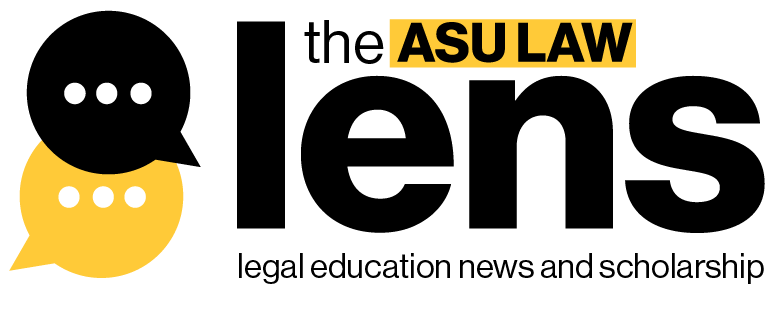
ASU Law fosters community for first-generation college students
For many first-generation college students, stepping into higher education can feel like entering the unknown. That was certainly true for first-year ASU Law JD student Carolina Olea Lezama, who is the first in her family to graduate from high school and college, and now the first to pursue a law degree. For her, this moment is more than a milestone — it’s a privilege.
“I can’t believe I get to be here, learning from these professors and surrounded by classmates who inspire me. It’s such a privilege and a gift, and not everybody gets to do this,” Lezama said, expressing the gratitude and excitement she has felt in her first weeks at ASU Law.
To celebrate and support students like Lezama, Director of Academic Success and Clinical Professor Alyssa Dragnich hosts the annual First-Generation Lunch, bringing together first-generation students and faculty to share experiences, discuss challenges and build community.
“I started hosting these lunches when I realized ASU Law had a sizable first-gen population, both students and faculty, but none of them knew each other. It’s not something people often talk about,” Dragnich said. “I have literally never asked someone if their parents went to college or what their parents did for work. But we know that being the first in your family to attend college can present extra challenges.”
At this year’s lunch that took place Sept. 2, six professors, all first-generation themselves, shared their journeys and the strengths they cultivated along the way.
Drawing from his own experience growing up in a small farm town in Idaho, where neither of his parents attended college, Professor Troy Rule highlighted three key strengths first-generation students bring to law school: gratitude for the privilege of learning and advancing; empathy for understanding those who face barriers to the legal system; and grit, the persistence to push through challenges and doubts.
“Just being here says a lot about you; that you are first-gen and that you have been able to climb to this point educationally,” he said. “Hold on to these qualities. They will carry you through law school and your career.”
Professor Sue Chesler shared her own first-generation journey, shaped by her parents’ resilience and determination. “My parents were Holocaust survivors. They moved to this country with no education, not speaking English at all,” she said. “They were amazingly supportive and truly understood the value of education, but could give me zero advice. I didn’t even know what I didn’t know. So, I didn’t make the best decisions necessarily, but I ended up in what I think, for me, is the best job in the world. It works out.”
Chesler encouraged students to be proactive in seeking guidance. “Ask as many questions as you can. At some point, you have to figure it out for yourself,” Chesler said, emphasizing that curiosity and initiative are key traits for navigating law school and building a career as a first-generation student.
The panel’s stories inspired students to reflect on their own journeys, sparking a conversation about identity, belonging and navigating professional spaces as first-generation law students.

“When you’re in spaces where most people aren’t first-gen, how do you overcome the urge to overshare just to prove you belong?” one student asked. Another asked, “I’ve sometimes wondered if I even want to be in spaces where people lack empathy or respect for those who are uneducated. How do you balance that? Is that the type of work environment I want to be in?”
The professors emphasized embracing first-gen identities with confidence, reminding students that making it to law school is a remarkable achievement and that their resilience and perspective are strengths that will carry them forward in the profession.
Lezama reflected on the strengths she brings to law school. “My lived experiences are my strengths because they guided me here. I didn’t grow up dreaming about law school because I didn’t know I could do it. I didn’t see lawyers around me. Growing up in Phoenix and seeing the challenges around immigration shaped who I wanted to be and made me want to understand how I can prevent injustice in my community.”
She also highlighted empathy as a key strength. “My experiences have made me an empathetic person. That will make me a better legal advocate because I don’t just see a client as a case. I see the person and understand what they are going through outside of the legal matter.”
Reflecting on the lunch, she said it left her emotional and grateful for the support at ASU Law. “It’s inspiring to see professors who are so respected and realize they were once first-gen students too. It makes me feel like I belong here and that one day, I can be that kind of example for someone else.”
The lunch gave students a chance to see themselves in the faculty, share challenges and gain guidance on navigating law school. More than anything, it reminded them that being first-generation is not a limitation, but a source of strength, one that fosters resilience, empathy and the ability to shape their futures and the legal profession.
Written by Andrea Estrada
The Alliance for Tribal Clean Energy and the American Indian Policy Institute’s Indigenous Leadership Academy launched the Tribal Energy Leaders Fellowship (TELF), a first-of-its-kind program designed to strengthen Indigenous leadership in the self-determined pursuit of clean energy.
The Sandra Day O’Connor College of Law at Arizona State University has launched the Civil Rights, Migration and Workplace Law Initiative, a new effort dedicated to advancing justice through education, scholarship and community engagement.
Related links
For the media
Legal studies research
Legal experts list
Media resources
Faculty directory
Staff directory
For all press and media inquiries, please contact: Kourtney Kelley, Assistant Director of Communications
[email protected]
480-965-6197
-
Newsroom homepage
-
LENS Newsletter
-
ASU Law Talks
